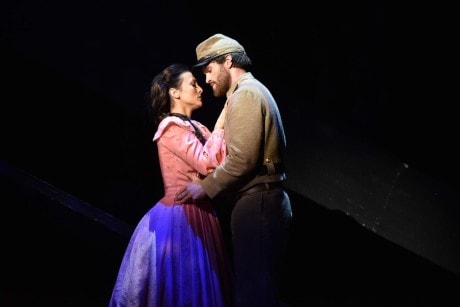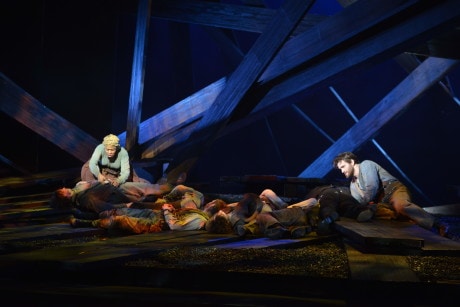Charles Frazier’s 1997 award-winning best-selling debut novel, adapted into an Oscar-winning feature film starring Jude Law, Nicole Kidman, and Renée Zellweger in 2003, is now a new American opera. Cold Mountain, with music by Philadelphia-based Pulitzer Prize winner Jennifer Higdon and libretto by Gene Scheer, is currently celebrating its east-coast premiere at Opera Philadelphia, in a co-commissioned co-production with The Santa Fe Opera and Minnesota Opera, in collaboration with North Carolina Opera.

The popular historical fiction about a deserter from the Confederate army during the American Civil War contains all the dramatic elements that render it suitably operatic: love, adventure, struggle, hardship, and death. Performed in English, with English supertitles, Opera Philadelphia’s expressive production, directed by Leonard Foglia and conducted by Corrado Rovaris, delivers all of the heartrending emotion, brutal conflict, and heroic action inherent in the tragic theme.
Taking its inspiration from Homer’s epic poem The Odyssey, but set in the hills of 19th-century North Carolina, the non-linear narrative, presented as a series of memories and flashbacks, traces the arduous journey of W.P. Inman (the author’s real-life great-great uncle, portrayed by Jarrett Ott), an injured and dispirited soldier who leaves the military hospital where he’s recovering from his wounds, to return home to his beloved Ada Monroe (Isabel Leonard). Making his way on foot, he encounters the horrifying atrocities of battle, and the hunger, destitution, and deprivation of a war-weary citizenry, while being hunted, along with other fugitives, by the Confederate Home Guard.
The complex story contains multiple sub-plots and characters. Most notable among them are the homeless stranger Ruby (Cecelia Hall), a resourceful mountain woman who befriends Ada, teaches her how to maintain her land after the death of her father, and helps her to survive; and Lucinda, a runaway slave (played with strength and poignancy by Marietta Simpson) who comes to the aid of Inman after he’s been captured, shot, and left for dead.
With impressive lead performances by baritone Ott and mezzo-sopranos Leonard and Hall–who not only offer rich vocals, but also skilled acting in the development of their characters–Higdon’s discordant post-modern style evokes the dissonance of wartime and the violent clashes of its enemies. But her sweeping score, which recalls the pivotal work of Aaron Copland, is also interspersed with passages that pay homage to the traditional folk songs and instruments of Appalachia, with bass Kevin Burdette, as Ruby’s negligent father Stobrod, fiddling live on stage; heartfelt duets between Ott and Leonard; and hauntingly beautiful requiems, sung in Act I by a harmonic chorus of wounded men that questions of the casualties, “What were their names? Buried, Buried, Buried and forgotten. When will it end?” The profound elegy is reprised in Act II by a chorus of the dead, in the opera’s single-most affecting scene; Elizabeth Braden consistently excels as chorus master.

As with the range of musical styles employed by the composer, the opera’s artistic design also takes a varied approach. Brian Nason’s conceptual lighting, with dramatic spotlights and moody colors, an abstract scenic design by Robert Brill, comprised of monumental wooden planks fallen at odd angles to suggest the destructiveness of war, and brilliant digital projections by Elaine McCarthy of snow and of the stars and moon in the nighttime sky, contrast with authentic period-style props, costumes by David C. Woolard, and wigs by David Zimmerman, and with the beautifully preserved interior of the Academy of Music–a venue that opened in 1857, and was in use during the era in which Cold Mountain is set (1861-65). The result is a unique conflation of then and now that brings the classic genre and historic subject into the experimental present.
Running Time: Approximately two hours and 45 minutes, including one 20-minute intermission.
Cold Mountain plays through Sunday, February 14, 2016, and is presented by Opera Philadelphia performing at the Academy of Music – Broad and Locust Streets, in Philadelphia, PA. For tickets, call (215) 893-1018 or purchase them online.
https://www.youtube.com/watch?v=2ZNamJGK80g




